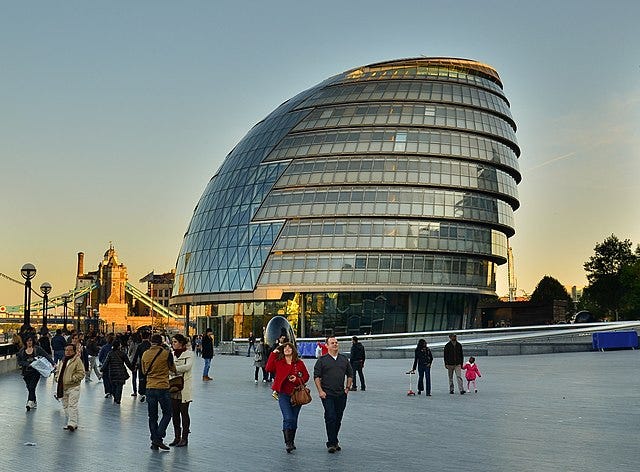Cold grey rivers and wine-dark seas
This week: how the home of London’s government tells a story of national decline; why the poet Homer couldn’t see the colour blue; and the curse of protected views.
“London’s living room” is standing empty. It’s 16 months now since the Greater London Authority vacated City Hall, the vaguely egg-shaped Norman Foster building it had occupied since 2002. The capital’s government has instead moved to The Crystal, another oddly shaped office building – this one spiky, rather than rounded – four miles east in the Royal Docks.
City Hall, 2002-21. Image: Garry Knight/Wikimedia Commons/CC BY-SA 2.0.
The motive for the move was entirely financial. The GLA never owned its previous home, instead renting it from St Martins Property Group, a holding company wholly-owned by the sovereign wealth fund of the government of Kuwait. Moving the authority to a building it actually owns will save it a fortune: the mayor, Sadiq Khan, had put the saving at £61m over five years; the GLA Oversight Committee has noted that the landlords were offering a rent reduction, which would cut the saving to just £37m. Either way, though, it’s a lot – especially when you consider that the original City Hall cost just £43m to build in the first place.
The story of London’s government says an upsetting amount about the attitude to public investment and the role of the state in UK politics as a whole. For much of its history, the capital had no proper government at all. It outgrew the bounds of the actual City of London over a thousand years ago, but didn’t get its own city government until the creation of the Metropolitan Board of Works in 1855. That wasn’t an elected council at all, but a sort of Victorian quango responsible for all the infrastructure (parks, sewers and so forth) that individual parishes were too small to take on. Why was it not a proper city council? Because the capital’s richest areas didn’t want it to be.
Eventually, that was replaced by the more democratic County of London (1889-1964), and then the bigger Greater London Council (1965-1986): both were based at County Hall, the grand 1911 building across the river from Westminster. In 1986, though, the Thatcher government scrapped the GLC, along with the other metropolitan county governments, mainly for having the gall to oppose her. For the next 14 years, London was again a major world city without a government.
It got one again with the creation of the mayoralty and the GLA in 2000. But these were the Blair years, and public ownership was out: more flexible and less capital-intensive renting was in. So the GLA never owned its own home. Then the years of austerity arrived, and it could no longer afford to rent it, either. It now looks suspiciously like it was a false saving not to just buy the building in the first place.
And so, even though much of the mayor’s role is as an ambassador for this city, London’s government is now based in a windswept development zone besides the ExCel Exhibition Centre, a part of town which you’d do all you can to avoid inflicting on a visitor. Meanwhile, the original City Hall stands empty, because nobody wants to pay the rent its landlords want to charge for a building with a helical staircase, an inconvenient shape and a massive aerial map of London on its lowest floor. It’s hard not to read all this as a symbol of government short-term-ism and national decline.
The “wine dark sea”: some notes on the history of colour
In 1858, William Ewart Gladstone – a former chancellor and future prime minister who was also, when not taking a slightly creepy interest in the moral salvation of prostitutes, a classicist – noticed something odd about the work of Homer: the world he depicts does not contain the colour blue. The only time the Greek word for the colour, “kyanós”, is used in either the Iliad or the Odyssey it refers to the eyebrows of Zeus: assuming the king of the gods was not some sort of Sonic the Hedgehog figure, that suggests the word then meant, simply, dark. The sky, in Homer’s telling, is instead like bronze.
Keep reading with a 7-day free trial
Subscribe to The Newsletter of (Not Quite) Everything to keep reading this post and get 7 days of free access to the full post archives.



